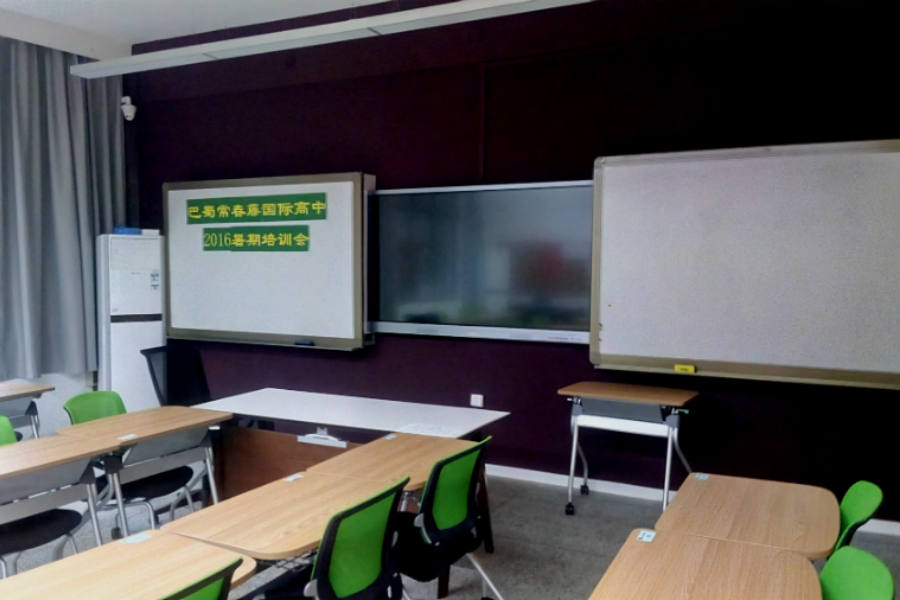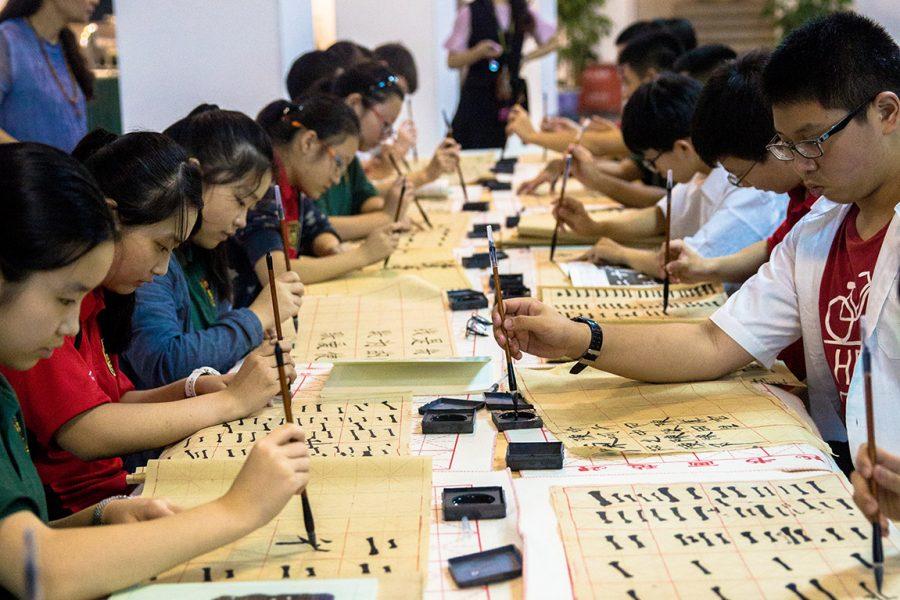Satellite school succeeds in new location
Photo Courtesy David Langenmayr
Students at the John Carroll School of Chongqing practice writing in Chinese during class. The school was established earlier this year and offers Chinese students a dual-program that combines American and traditional Chinese curricula.
JC’s partnership school, the John Carroll School of Chongqing, officially opened its doors in September. The satellite school is a part of the Chongqing Bashu Ivy School and is the home of 40 Chinese tenth graders, three American teachers, and 16 Chinese teachers.
With the help of a program called Knowledge Link, the satellite school integrates American and international education, which ultimately allows the students to obtain a JC diploma while living in China. According to the official school website, this will give students a stronger academic background that will allow them to compete professionally and academically on a more global scale.

This is one of the standard classrooms used by the John Carroll School of Chongqing. There are currently 40 Chinese tenth graders, three American teachers, and 16 Chinese teachers.
Originally, the partnership school was established in Shenzhen, China, the home of several International students currently enrolled at JC, but due to a lack of enrollment, JC switched the school’s location. “We had pictures of John Carroll stuff in the halls, but they didn’t recruit enough students to begin. We tried it for two years and it didn’t catch,” President and Interim Principal Richard O’Hara said.
During this time, JC was simultaneously developing a relationship with the Chongqing Bashu Ivy School through the Knowledge Link program and had a backup plan for the satellite school.
Academic Dean of the John Carroll School of Chongqing David Langenmayr likes the idea of blending two cultures together, especially expanding on an old, traditional setting like Bashu and incorporating materials from a traditional prep school like JC.
There were 100 students who applied to start in the fall. In order to be considered, applicants had to meet English, math, and physics requirements. “We wanted academically strong students who were willing to put themselves out there in an all English environment,” Langenmayr said.
O’Hara said he wanted the school to resemble JC as much as possible. The satellite school is working toward aligning the curriculum and grading system with JC’s. As of now, students attending the school are offered 10 academic courses, four of which are American courses: Physics, Reading for Writing, World Cultures and Geography, and Pre-Calculus.
Depending on how much time is spent in class, students can receive 0.2, 0.5, or 1.0 credit for the class. For example, if a course is worth 1.0 credit, students will have that class five times a week, whereas if a class is 0.5 credit, then they will be in class two or three times a week.
Students are required to take all of the offered courses, but they will have a wider selection next semester with the implementation of more challenging courses. “We haven’t quite brought up the AP and Honors yet, but we’re moving into that,” Langenmayr said.
Langenmayr believes that these academic opportunities provide benefits for Chinese students because the American teaching style follows a more student-centric approach. “American teaching tends to be more about creating an environment where the learners acquire the needed knowledge through their own lenses. Asian teaching is more about the ‘same for all’ approach,” Langenmayr said.
Sophomore Chinese International JC student Nancy Wang agrees that this program will benefit its students. “Many Chinese students can’t come to America because of money. If they go to the international school, it’s easier for them to get the English education. It’s kind of a similar way to experience the American education, Wang said.
The additional diploma from the school will also help the Chinese students enroll at American universities. “[The students’] goal is to get into an American university. [There is] a very big push here to get into an American school,” Langenmayr said.
Wang believes there are benefits for the students who are able to attend school in America. “Going abroad to study is a good experience for me and for my future. Even when I go back to China after college, I can still get a better job than the students who study in China,” Wang said.
While the school is new this year, future developments are already in the works. According to Langenmayr, they are in the process of building a new campus which should be open next year. “We’ll have tenth, eleventh, and twelfth [next year]. It will initially go at a rate of classes [of] about 50 [students]. Then after year three, we’ll probably expand that number,” Langenmayr said.
Langenmayr is trying to plan summer programs for the students to come to JC to do some activities on campus. Although the details haven’t been worked out yet, he hopes to have some of his students communicate with American students to strengthen the relationship between the two schools.
O’Hara agrees that student interaction is something that appeals to him. “I would love to get a Skype going between [students here] and students there,” O’Hara said.
Caroline Cooney is Editor in Chief for The Patriot and jcpatriot.com.



